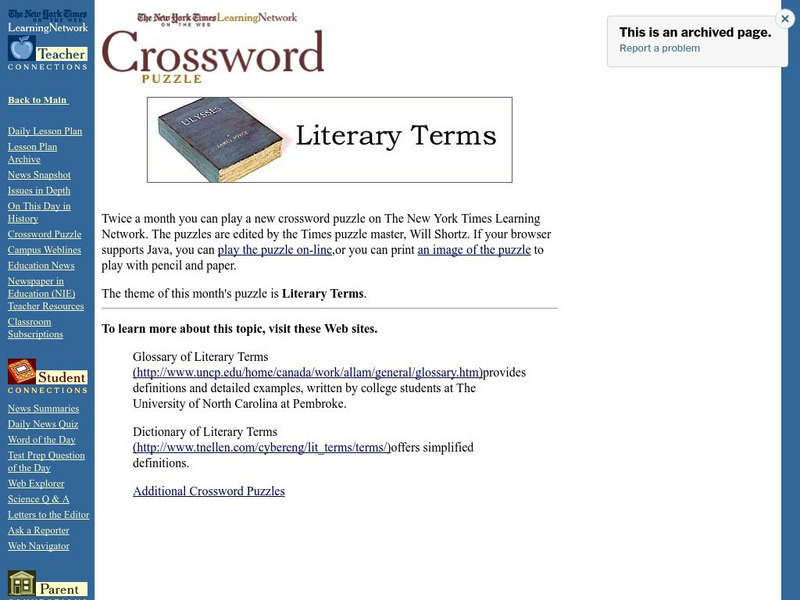Hi, what do you want to do?
Texas Education Agency (TEA)
How to Read and Analyze a Poem (English III Reading)
A poem is compressed speech, like a can of frozen juice with all the water pressed out. An interactive teaches users how to reconstitute the language, the structure, and the literary devices to appreciate all the subtleties the poet...
Texas Education Agency (TEA)
Simile and Metaphor (English III Reading)
The key idea in this interactive exercise designed for high schoolers is that figurative language, especially similes, and metaphors, add layers of meaning to a text. Users examine examples from speeches, ads, movie dialogue, and poems,...
EngageNY
Close Read, Part 2: “Hugo, the Lord’s Nephew”
No, not literally. Scholars read Hugo, the Lord’s Nephew to compare figurative and literal language. Readers learn about simile, metaphor, personification, and idioms with a graphic organizer. Pupils then answer text-dependent...
EngageNY
The Storyteller’s Toolbox and Excerpt 4 First Read
It's story time! Scholars take a look through the eyes of a storyteller as the teacher reads aloud The People Could Fly. They also listen as the story is played on video. Learners then answer questions about the reader's facial...
Chandler Unified School District
Ben Franklin Aphorisms
Benjamin Franklin's famous aphorisms are a perfect time capsule of colonist values in the mid-18th century, as well as a clever reminder of the way life still works today. Middle and high schoolers select one aphorism to interpret...
EngageNY
Grade 9 ELA Module 1, Unit 1, Lesson 7
A story about feral girls raised by werewolves will have some interesting character development! Track how the girls and their teachers act, speak, and change with a lesson focused on Karen Russell's "St. Lucy's Home for Girls Raised by...
Building Background Knowledge: Learning About the Historical and Geographical Setting of Esperanza Rising
Set up your class to read Esperanza Rising, by Pam Munoz Ryan, through a class read-aloud and exploration of the setting. The detailed lesson plan outlines each step. First, class members read over the first few pages and focus on the...
Curated OER
Figurative and literal language through the study of Shakespeare
Sixth graders explore figurative and literal language. They study literary devices through short pieces of Shakespeare's work. Then investigate Shakespeare's works and life.
Curated OER
Metaphors in Context
Do your class members know where the phrase "raining cats and dogs" come from? They will after viewing a presentation about metaphors. The concise definitions and clear examples make for a strong introduction to this element of...
Curated OER
Preparing for Poetry: A Reader's First Steps
Students complete poetry analysis using William Shakespeare's "Sonnet 130" as a part of a study of figurative language. In this Shakespearean language lesson, students define literal and figurative language and practice paraphrasing and...
Read Works
Read Works: 3rd Grade Lesson: Poetry
[Free Registration/Login Required] A lesson in which students use two provided poems to learn to identify and understand the use of similes and metaphors in poetry. Lesson includes direct teaching, guided practice, and independent...
New York Times
New York Times: Crossword Puzzle: Literary Terms
An interactive and printable crossword puzzle developed by the New York Times Learning Network. The theme of this puzzle is Literary Terms. Other links are included.
















